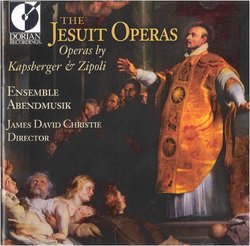| All Artists: Giovanni Girolamo (Johann Hieronymus) Kapsberger, Domenico Zipoli, James David Christie, Ensemble Abendmusik, Michael Collver, Anne Harley Title: Kapsberger & Zipoli: The Jesuit Operas Members Wishing: 0 Total Copies: 0 Label: Dorian Recordings Release Date: 1/28/2003 Genre: Classical Styles: Opera & Classical Vocal, Historical Periods, Baroque (c.1600-1750) Number of Discs: 2 SwapaCD Credits: 2 UPC: 053479324320 |
Search - Giovanni Girolamo (Johann Hieronymus) Kapsberger, Domenico Zipoli, James David Christie :: Kapsberger & Zipoli: The Jesuit Operas
 | Giovanni Girolamo (Johann Hieronymus) Kapsberger, Domenico Zipoli, James David Christie Kapsberger & Zipoli: The Jesuit Operas Genre: Classical |
Larger Image |
CD Details |
CD ReviewsFascinating Discoveries Charles Richards | Los Angeles, CA | 08/11/2003 (5 out of 5 stars) "Chances are neither of the two works in this set will ever reach the popularity of "La Boheme" or "La Traviata", or even be performed on any major opera stage, but they are invaluable in our understanding of early baroque musical theatre, the evolution of opera, and that cloudy overlap genre known as "sacred drama".
Neither of the two works on this disc are really "operatic" in the way we think of opera today. Both were composed primarily as sacred works, not for the popular stage, and neither have a great deal of dramatic thrust (the first, Kapsberger's "Apotheosis", is almost anti-dramatic). The "Apotheosis" or, to give it its full title, the "Apotheosis Sive Consecratio SS. Ignatii et Francisci Xaverii" by Kapsberger is one of his few vocal works to have been recorded, and the only full-length one, to my knowledge; Kapsberger is a composer more known for his lute music than his vocal compositions. Comissioned for the celebration of the canonization of saints Ignatius and Francisci Xaverii, it premiered around the same time as Monteverdi's "L'Orfeo", and it gives us an interesting insight as to what kind of opera was being written at the time. More of a pageant than a drama, there is very little action in the "Apotheosis"' five acts. Most of the characters are either allegorical or representational (many of them representing various nations: Japan, Portugal, etc.) Like Peri's "Euridice" and other early 17th century operatic works, it relies mostly on declamatory recitive (considered a highly new and experimental form in its time) and madrigalesque passages. There are no arias in the modern sense, although there are a few passages of arioso and one strophic song (based on one of Kapsberger's "Villanella"). In comparison with its best known contemporary work, "L'Orfeo", it is highly old-fashioned and lacking in drama, one can understand why "L'Orfeo" caused such a stir and why it remains one of the landmarks in operatic history. Never-the-less, it is an enjoyable work, and executed perfectly; especially of note is the silvery voice of Ellen Hargis as Rome. The second work in the set was written a bit later, and one can see how far the form had come in just a few years. Zipoli is remembered mainly for his sacred music, a good deal of which has been recorded, and he remains one of the best represented composers of the early days of the new world. Despite the fact that most music written in the new world at this time was a bit anachronistic, and it was hard for composers, in what was considered by Spain, culturally, as an insignifigant back water, to "keep up" with cutting edge of new music being written in Europe, it is amazing how up-to-date Zipoli's short sacred drama, "San Ignacio de Loyola" is. Here we have, unlike Kapsberger's earlier work, definite divisions into aria and recitive, although the arias are mostly short and strophic, only a couple written in the new "da capo" form which would shortly completely dominate operatic literature for most of the 18th century. But there is immense charm in most of the arias, and although the opera is, also, a bit short on drama, the characters come across clearly, and there are even doses of humour in the first act given to two demons who, as usual, get the best tunes in the work. The performances are of extremely high quality, without a weak link in the group. James David Christie has assembled a fine troupe of singers, including the aforementioned Ellen Hargis, the fine countertenor Randall Wong, and a host of soloists and instrumentalists who are sure to please any lover of music from this period. The presentation is also excellent, with informative and well-written liner notes, full texts and English translations, as well as (as is usually the case with Dorian Recordings) a gorgeous CD cover (unfortunately not re-produced on this web site, but take my word for it). While neither of these works will ever, in all probability, become regularly performed, or even recorded a second time, lovers of early Baroque opera can feel quite indebted to Christie, his performers, and Dorian Recordings for introducing us to a previously unknown slice of operatic history." |
